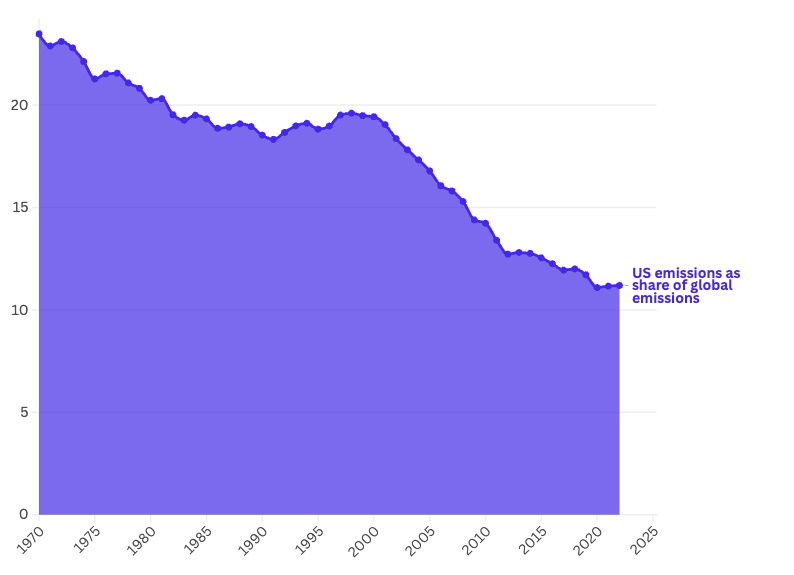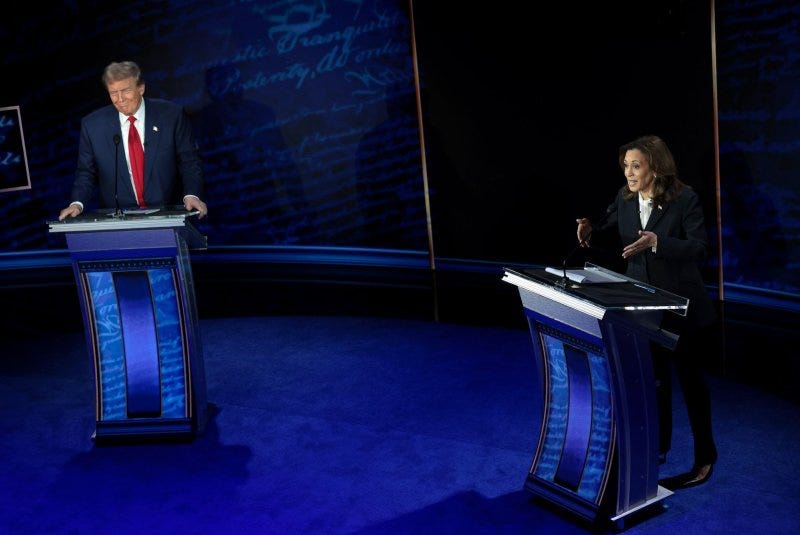No, Climate is Not on the Ballot
This American election is hugely consequential, but climate happens on an entirely different scale.
An insane amount is riding on tomorrow’s presidential election: the survival of American democracy, the peace and stability of Europe and Asia, the viability of the liberal world order. Living in Japan, cheek-by-jowl with an unpredictable North Korea and a revanchist China, nobody has to remind me that the decisions Americans make tomorrow could very well have life-and-death consequences for me and my children.
Big, future-of-civilization questions are on the ballot…but not the climate.

The truth, seldom faced squarely, is that the US now accounts for too small a share of global emissions for the decisions its politicians make to move the needle very much on a global scale. The US media hardly ever explains this forthrightly, which has left Americans with a bad case of Main Character Syndrome on this stuff.
The US now accounts for 11.2% of global emissions — less than half of what it was in 1970. Its share fell in 22 of the 25 years between 1997 and 2022, in Democratic and Republican administrations alike.
The three years when the U.S. share did rise happened to be years a Democrat sat in the Oval Office — Obama in 2013, and Biden in 2021 and 2022. It fell every year that George W. Bush and Donald Trump were in office. Not because Bush or Trump gave a shit —they plainly didn’t— but because the forces driving global trends are vast, systemic variables utterly beyond the power of any one human being, even if that human being happens to be President of the United States.
In global terms, this election might end up explaining why AMOC collapsed a couple of months before it would have otherwise, or a couple of months after.
That’s not nothing, but it’s not much.
Where the real action is
Over the next four years, Xi Jinping will make many decisions that are more important to the future of the climate than the results of this election. Developing country leaders are the ones making decisions in the places driving the spike in global emissions: the choices Indonesian utilities, Indian states, the Nigerian cabinet, Bangladesh’s nuclear regulators and Abdel Fattah el-Sisi make will probably have a deeper impact on the climate’s future trajectory than whether Kamala Harris or Donald Trump run the U.S. government for the next four years.
You might say the impact of tomorrow’s election will be felt more via what it does to U.S. diplomacy, but this just isn’t convincing. Developing world emissions shot up through a 12 years of Obama- and Biden-administration climate sermonizing at COPs just as quickly as they did through 12 years of Bush and Trump administration indifference.
On the list of factors affecting developing world emissions growth, gringo harangues at COP rank far behind the true drivers of these trends: population growth, GDP growth, and energy strategy. The whole notion that which delegation the U.S. sends to climate talks is a main driver of emissions growth is a West Wing fantasy projected onto an indifferent world.
None of this is to say this election isn’t important. This election is enormously consequential.
It’s just to say that climate happens on such an unimaginably vast scale that even enormously consequential things don’t really move the needle much.
The Inflation Reduction Act didn’t.
And tomorrow’s election won’t.



Look at the bright side: If either of these two idiotic blowhards get us into World War III, the following nuclear winter will ensure nobody will care about global warming anymore…